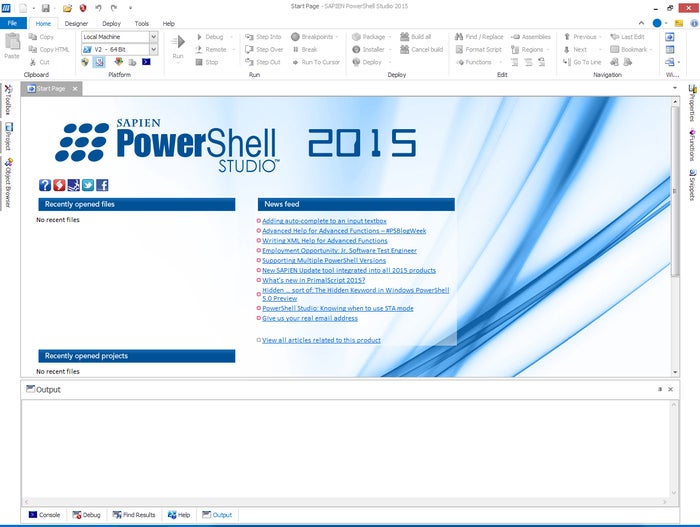Powershell Form Designer Freeware Photo
If you use PowerShell and WinForms this way, there is no built-in editor to lay out your forms, so you need to manually handle position, sizing, and event hookup. (However, SAPIEN Technologies has a product called Primal Studio that contains a tool that works like the Visual Basic Forms Editor. Home to Admin Script Editor (ASE. To more quickly and more easily create and edit scripts in PowerShell. Using the innovative ScriptForm Designer. PhotoPad Photo Editor Free 3. Account Lockout Examiner for PowerShell 1.0.014 (Freeware). PowerShell Forms Designer Developing GUI-based PowerShell.

This post is part of the Learning GUI Toolmaking Series, here on FoxDeploy. Click the banner to return to the series jump page! “I’ll never do it the old way again. ” -me If you’ve been following my blog for any time, you’ll know that I love making tools using PowerShell. I’ve written on the topic previously, and the approach I took then were based off of using the.net System.Windows.Forms class which really meant that you had to painfully, agonizingly create a GUI one element at a time.
I knew there were other methods, using something scary called XAML, and I’d even seen other’s tutorials, but frankly thought it looked too hard. So I stuck with the pulling teeth method for years. Until one day, I had some spare time and thought I’d take a look at the other GUI design method again I wish I had sooner, because it is so EASY! What You’ll Need: • Visual Studio. I’m using Community Tech Preview 2015, but you can do this with Visual Studio Express too. • A bit of helper PowerShell code, inspired by the awesome Chris Conte in. I’ll provide the snippet we need, when we need it.
Getting Visual Studio is easy, just download either the CTP edition or the trial of Ultimate. There are ways of getting it for free too, via DreamSpark, MSDN, MVP Access or you can always use Express.
Assuming you’ve been able to install Visual Studio How this is going to work A bit of history first on how this differs from what we did before. Released with.net 3.0 back in 2006, Windows Presentation Foundation sought to rearchitect the way Windows Developers wrote their programs. Instead of WinForm and the incredibly verbose style of configuring each element line by line, Microsoft brought a more civilized, CSS inspired design pattern to the world of Windows UX Design. C# could be used as the code-behind (the actual payload of making things work), while the UI could be designed and themed in XAML, Microsoft’s new Extensible Application Markup Language format (inspired by XML), and the whole thing could easily be themed much like a website with CSS. Since PowerShell is also based on.net, we can use Visual Studio to draw and design a GUI, then easily import it into PowerShell to use to make our own GUIS, but with our favorite scripting language used as the engine (instead of C#). Microsoft Office 2013 Professional Plus (32-bit) (x86) Activator[chingliu].
And the cool part is that anywhere that PowerShell runs and a GUI is available, our code will work there too! (Sorry Server Core users of the World, Server Core does not have the WPF assemblies needed to run GUIs) Interested? Preparing Visual Studio Start by launching Visual Studio it’s so purple and creepy! Like a Gore Magala!
Not a Monster Hunter fan? Okmoving on You’ll want to click New Project on the left side of your screen Next, follow the numbers in the image below as you will 1. Type WPF in the search box 2. Click WPF Application in the main window, and then 3. customize the project name (if you’d like) and click OK. This is what you’ll see, the fully blown Visual Studio UI. There is a lot of cruft we can disable though, so lets hide some elements.
For now, we don’t need Solution Explorer, which holds all of the files related to our project (since we won’t actually be publishing this project, just building its UI here) and we won’t need Properties until we add some items. You can bring these items back by hitting F4, F6 or choosing them from the Alt-View menu up top Now, we will want to display and then pin the toolbox on the left side, to give us our goods we can drag and move around. Alright, there we go, much less noise, and now we’re able to get started. Making a GUI in Visual Studio The center area now holds our form. You’re looking at what the GUI will be for your script or tool. You can resize the window, or drag and drop items into our form.
Good introduction Stephen. I also prefere to use visual studio in order to be able to use XAML to generate a GUI for a PowerShell application since I think XAML apps look way nicer then WPF. The main issue I had though, when I compared it to WPF (using Sapien PowerShell Studio) is the problem with multithreading. Basically, it ‘difficult’ to make your GUI responsive to user interaction.For instance, a task that would execute for some time in the back ground would make the application hang until that task in the background is finished. I didn’t face these issues with WPF/Sapien powershell Studio. Have you found an (easy way) to make the GUI not hang in these type of cases?